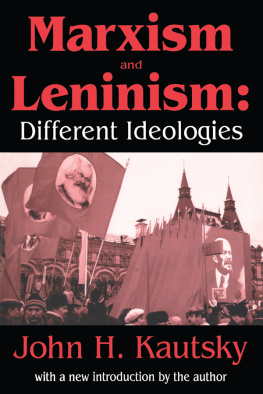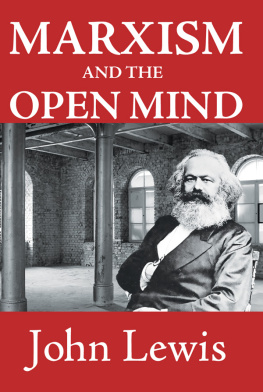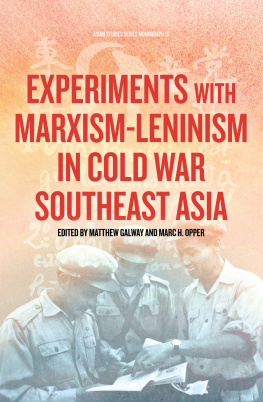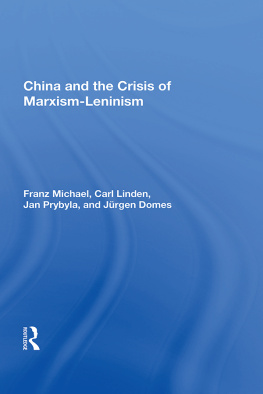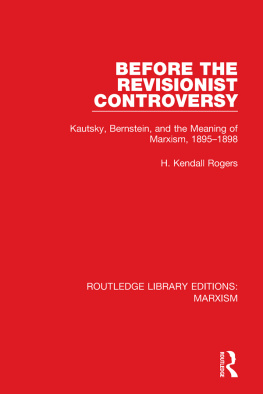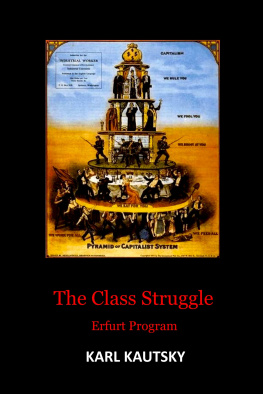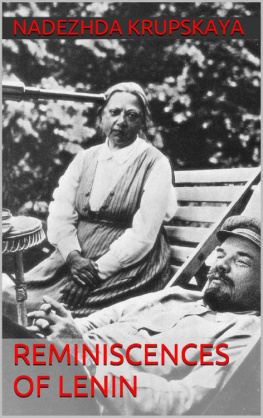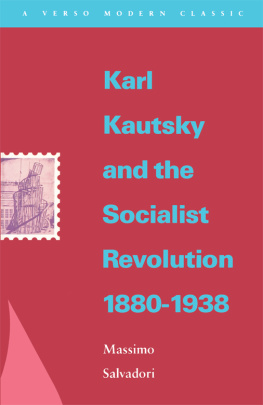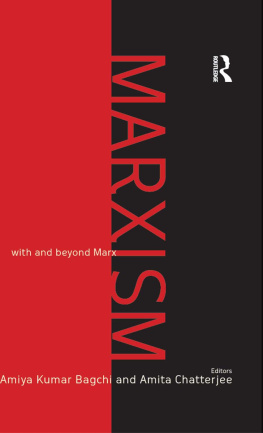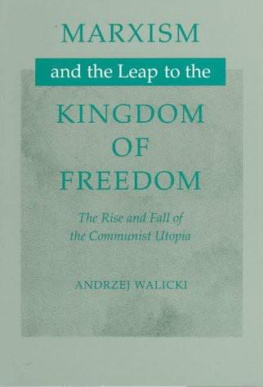Originally published in 1994 by Greenwood Press.
Published 2002 by Transaction Publishers
Published 2017 by Routledge
2 Park Square, Milton Park, Abingdon, Oxon OX14 4RN
52 Vanderbilt Avenue, New York, NY 10017
Routledge is an imprint of the Taylor & Francis Group, an informa business
New material this edition copyright 2002 by Taylor & Francis
All rights reserved. No part of this book may be reprinted or reproduced or utilised in any form or by any electronic, mechanical, or other means, now known or hereafter invented, including photocopying and recording, or in any information storage or retrieval system, without permission in writing from the publishers.
Notice:
Product or corporate names may be trademarks or registered trademarks, and are used only for identification and explanation without intent to infringe.
Library of Congress Catalog Number: 2001047645
Library of Congress Cataloging-in-Publication Data
Kautsky, John H., 1922-
[Marxism and Leninism, not Marxism-Leninism]
Marxism and Leninism: different ideologies : an essay in the sociology
of knowledge / John H. Kautsky ; with a new introduction by the author.
p. cm.
Originally published: Marxism and Leninism, not Marxism-Leninism.
Westport, Conn. : Greenwood Press, 1994, in series: Contributions in
political science ; no. 335.
Includes bibliographical references and index.
ISBN: 0-7658-0911-7 (pbk.: alk. paper)
1. SocialismHistory. 2. CommunismHistory. I. Title.
HX73.K375 2001
335.4dc21 2001047645
ISBN 13: 978-0-7658-0911-7 (pbk)
To the Department of Political Science at Washington University in St. Louis
If, approaching age eighty, I may be forgiven some autobiographical or, rather, autobibliographical reflections, I can now see the beginnings of the history of the present book in my very first book, Moscow and the Communist Party of India (Wiley, 1956). There I documented and analyzed the emergence, beginning in 1947, of a drastically changed Communist strategy in response to the development of the Cold War and also as a result of the Chinese Communist revolution. The Communists enemy was now defined no longer as capitalism or fascism, but as imperialismthat is, the United States. The classes whose members were to be appealed to were hence no longer merely the working class or the lower classes generally, but also the capitalist bourgeoisie. By late 1949, an authoritative Chinese Communist statement, strongly endorsed in Moscow, went so far as to prescribe that the working classthat is, the Communist partiesmust unite with all classes, parties, groups, organizations and individuals opposed to imperialism.
In one paragraph, I noted that the effective substitution of the Cold War for the class struggle was a complete perversion of Marxism, but only a logical development of Leninism. In Marxism, socialist parties were tools of the working class, while to Lenin the working class was the tool of the Party. Other classes could be similarly used, not only obviously the peasantry, but even the capitalists.
Here the point I tried to substantiate in the present book is already implicit: Marxism and Leninism are politically quite different ideologies. Marxism appeals to and seeks to represent the industrial working class. Leninism seeks to use the working class and other classes for its ends. But what are its ends? What interests does Leninism represent? What functions do classes perform when they serve as tools of the Party? There are no answers to these questions in my first book.
What I did not yet understand, or at least expressand neither did the Communist leaders themselveswas that the shift from anti-capitalism to anti-imperialism, which involved a shift from a focus on industrial Western Europe to one on underdeveloped Asia, was more than the adoption of what I still thought of as a mere Communist strategy. It revealed that Leninism was an ideology and Communism was a movement appropriate to the politics of underdeveloped countries rather than of industrial ones.
In Russia, and then the Soviet Union, the Communist regime pursued policies of a modernizing movement in an underdeveloped countryabove all, the policy of rapid industrialization. But for thirty years after they gained power, the Communist leaders in Russia, thinking of themselves as Marxists, concentrated their efforts to gain support abroad on converting the workers of industrial Europe to their cause. These efforts mostly failed, for Soviet success in industrialization, largely at workers and peasants expense, had no appeal in already industrialized countries.
Communist parties no doubt shifted their propaganda line from class struggle to anti-imperialism to serve the needs of Soviet foreign policy in the Cold War. But in this process, they replaced the Marxist language of proletarian class struggle against capitalism that was irrelevant to the politics of underdeveloped countries with the language of anti-imperialism. It could appeal in such countries to many people regardless of their class, and particularly to modernizing movements aiming at rapid industrialization. After thirty years, Communist parties in underdeveloped countries could at last speak a language that could be politically effective and was consistent with the appeal of Soviet domestic policy of rapid industrialization.
As my research interests broadened to a study of the politics of underdeveloped countries, and especially of anti-colonial and anti-traditional movements and their revolutions, I soon realized that it was not only the new strategy evolving from 1947 on, but the very nature of Leninism that made Communism such a modernizing movement. I advanced and elaborated this view in my two books, Political Change in Underdeveloped Countries (Wiley, 1962) and Communism and the Politics of Development (Wiley, 1968). The latter is a collection of ten articles on Communism I had written from 1955 to 1968. One of the earliest ones, first published in 1957, concluded with the following paragraph, which already outlines some of my arguments in the present volume:
It may now be time to abandon the categories of thought in which Lenin conceived of himself and his revolution and in which most of his contemporaries, both friends and foes, were almost necessarily entrapped Lenin was not voicing the ideology of an industrial proletariat but was a spokesman of a part of the intelligentsia in an underdeveloped country, of a group in quest of political power and in search of a short-cut to industrialization. The Bolshevik revolution, then, is to be understood not as the first proletarian-socialist revolution but as the first successful seizure of power by such an intelligentsia
In my next book, The Political Consequences of Modernization (Wiley, 1972), I argued that the underdeveloped countries were not merely behind the industrialized ones in their development, but were following a different historical track, and I introduced the distinction between the processes of modernization from within and modernization from without. My analysis of Communism was no longer presented in a separate book or chapter or even paragraph, but was completely integrated with the analysis of ideologies, movements, revolutions, and regimes of modernizers that are reactions to modernization from without and quite different from the political consequences of modernization from within.

